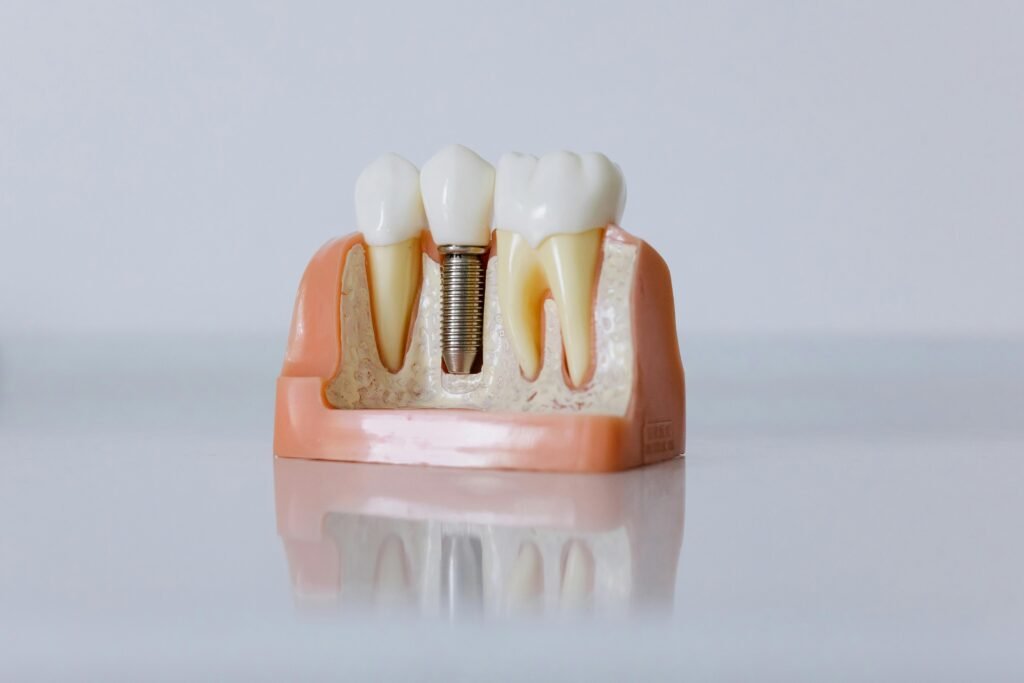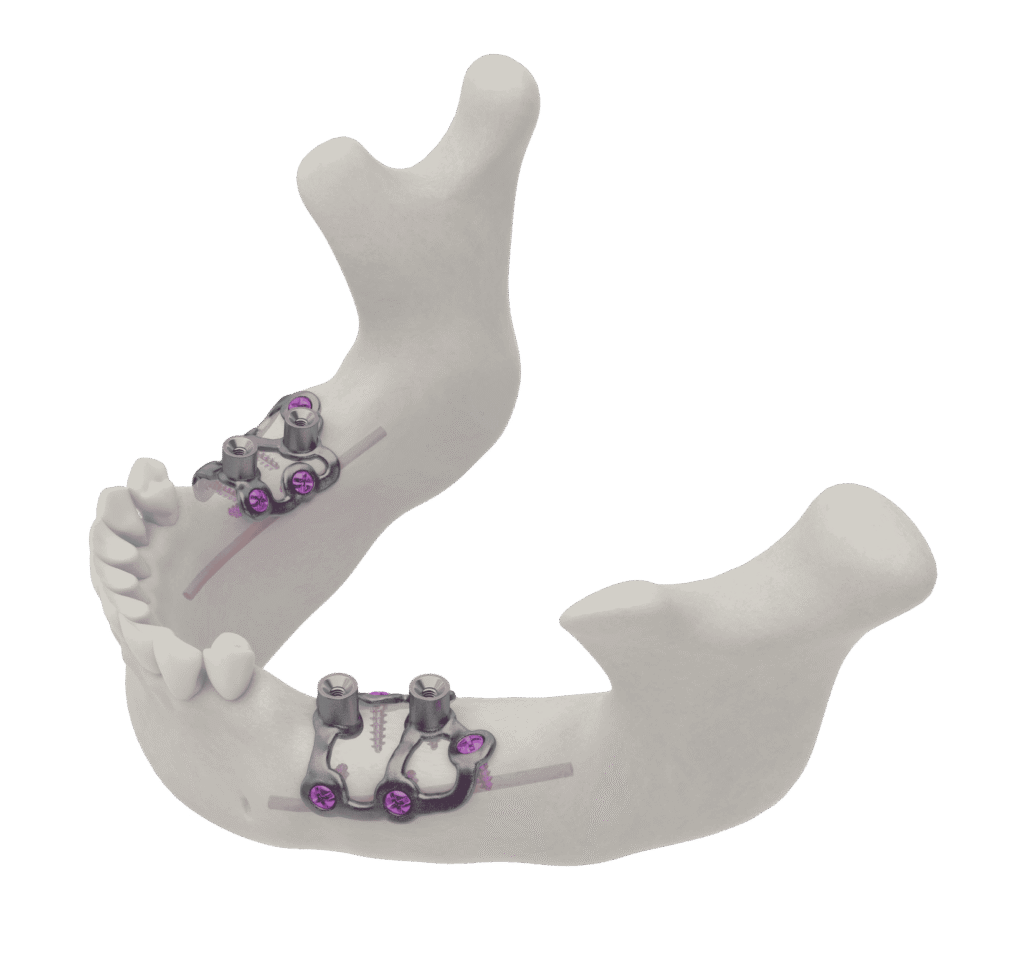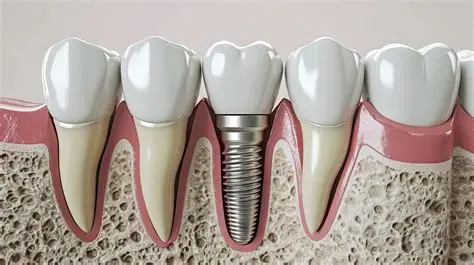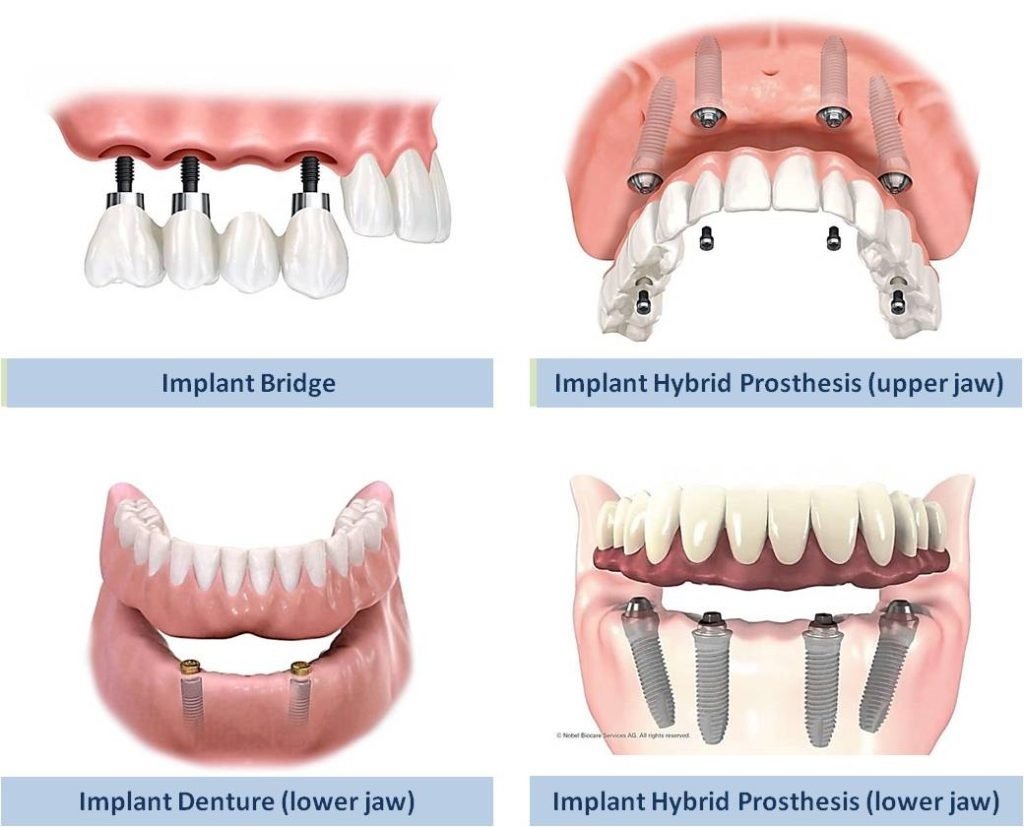What Are Dental Implants?

Dental implants are advanced medical devices used in modern dentistry to replace missing teeth. A dental implant is a small titanium screw that is surgically placed into the jawbone, where it fuses naturally with the bone in a process known as osseointegration. This artificial root provides a strong foundation for a dental crown, bridge, or denture.
The concept of dental implants as we know them today was pioneered in 1952 by Swedish orthopedic surgeon Per-Ingvar Brånemark. Today, they are considered the gold standard in tooth replacement, offering both stability and long-term success, with survival rates reaching up to 98% in scientific studies.
Types of Dental Implants


There are two historically recognized types of dental implants:
- Endosteal Implants – Placed directly into the jawbone. These are the most commonly used implants today and offer the highest long-term success.
- Subperiosteal Implants – Placed on top of the jawbone but underneath the gum tissue. These are rarely used now due to lower survival rates compared to endosteal implants.
In modern implant dentistry, endosteal implants are the universal choice because of their strength, integration, and long-term predictability.
Applications of Dental Implants

While the primary role of dental implants is to replace missing teeth, they have additional applications:
- Single Tooth Replacement – Using one implant to support a single crown.
- Multiple Tooth Replacement – Supporting a bridge or several connected crowns.
- Full Arch Replacement (All-on-4 or All-on-6 technique) – Using a minimal number of implants to support a full set of upper or lower teeth.
- Implant-Supported Dentures – Providing better retention and stability for removable dentures.
- Orthodontic Support (Mini-Implants / TADs) – Temporary implants used to move teeth more effectively during orthodontic treatment.
Why Choose Dental Implants?
Compared to traditional dentures or bridges, dental implants offer several scientific and functional advantages:
- Preserve jawbone health by preventing bone resorption.
- Do not damage adjacent teeth, unlike traditional dental bridges.
- Look, feel, and function like natural teeth.
- Improve chewing efficiency and speech compared to removable dentures.
- Long-term predictability, with proper care lasting decades or even a lifetime.
Specialists Involved in Dental Implant Treatment
Dental implants require both surgical and restorative expertise. Depending on the case, one or more dental specialists may be involved:
- Oral and Maxillofacial Surgeons – Experts in surgical procedures involving the jawbone.
- Periodontists – Specialists in gum and bone health, often placing implants.
- Prosthodontists – Experts in designing and placing crowns, bridges, and dentures on implants.
- General Dentists – Many are trained to restore or even place implants in straightforward cases.
Dental Implant Procedure: Step by Step

1. Consultation and Planning
- Clinical examination of the oral cavity.
- Imaging (X-rays, panoramic scans, or CT scans) to evaluate bone quality and quantity.
- Assessment of systemic health and suitability for surgery.
2. Preparatory Procedures (If Needed)
- Tooth extraction if a damaged tooth is present.
- Bone grafting if bone volume is insufficient.
- Sinus lift (sinus augmentation) for implants in the upper jaw when sinus space is limited.
3. Surgical Placement
- The titanium implant is placed into the jawbone.
- A healing cap is attached, and the gum is sutured.
- Healing time: typically 2–6 months to allow osseointegration.
4. Healing and Osseointegration
- The bone fuses with the implant surface.
- A temporary prosthesis may be provided during this period.
5. Abutment and Crown Placement
- After successful healing, an abutment (connector) is attached to the implant.
- A custom-made crown, bridge, or denture is secured to the abutment.
Aftercare and Maintenance of Dental Implants
For long-term success, proper oral care is essential:
- Daily oral hygiene: brushing and flossing around implants.
- Regular dental visits: monitoring gum health and bone stability.
- Professional cleaning with special tools designed for implants.
- Monitoring bite forces: to avoid overloading the implant.
A potential complication is peri-implantitis, an inflammatory condition affecting the tissues around the implant, similar to gum disease. Preventive care is key to avoiding this risk.
Is Dental Implant Surgery Painful?
Dental implant surgery is generally well-tolerated. It is usually performed under local anesthesia, with sedation options available for anxious patients. Most patients report only mild discomfort after the procedure, comparable to a tooth extraction. Swelling and minor pain are normal during the first few days and can be managed with standard pain relievers.
Risks and Complications
As with any surgical procedure, dental implant placement carries potential risks, although they are rare when performed by trained professionals. Possible complications include:
- Infection at the implant site
- Nerve or blood vessel injury
- Implant failure due to poor osseointegration
- Bone loss or peri-implantitis
- Sinus complications (for upper jaw implants)
Careful treatment planning and follow-up care significantly reduce these risks.
Key Takeaway
Dental implants represent the most advanced, stable, and natural solution for tooth replacement in modern dentistry. With decades of scientific research supporting their effectiveness, implants not only restore aesthetics and function but also preserve long-term oral health.
Ready to Restore Your Smile?
Dental implants can transform your oral health, confidence, and quality of life. If you’re considering tooth replacement, consult with a qualified dental professional to see if you’re a good candidate for implants.
👉 Book your consultation today and take the first step toward a healthier, natural-looking smile


